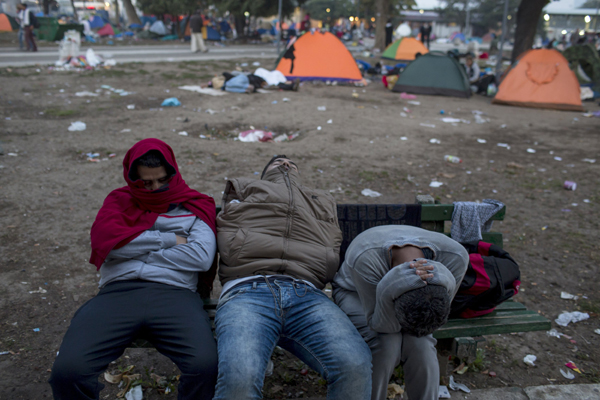Thousands of Syrian refugees continue to reach Europe
Updated: 2015-08-28 09:04
(Xinhua)
|
|||||||||||
 |
|
Migrants sleep on a bench in a park near the main bus and train station in Belgrade, Serbia, August 26, 2015. [Photo/Agencies] |
According to reports of several Syrian refugees, the price for the boat is around 1,200 U.S. dollars per person. The captain of the boat is one of the passengers that receives training for five minutes.
On a highly unsafe 10 km journey to the Greek islands that lasts several hours, they get often stopped and returned to the shore by the Turkish police, and then have to pay another 200 U.S. dollars to illegal boat renters in order to have another try.
"Several hundred meters from the Turkish shore, the engine that pulls 50 people with only 15 horse power would stop and we would have water inside the engine. Water would come in the boats and they would be inundated. Big waves are the most frequent reason why people die," Mohammad said.
According to him, once migrants reach Greece, as well as Macedonia and Serbia, they lack water and food.
"We are human beings we have to survive. We have money but where to buy goods in the bush or in the desert? Sometimes we had to walk for kilometers between each border. Children needed toilet and to eat. There is crime, fear, animals, snakes, scorpions. You cannot see humanitarian organizations along the road," Mohammad continued.
During the trip, migrants rarely get the chance to stay in a hotel. Usually they sleep in the open air or in tents. They wait hours in long lines to get papers from police stations to confirm their identity and enable continue their journey.
Shops often charge them up to two times the normal price for food and water, using toilets or charging mobile phones. Migrants told Xinhua they feel they are "pushed around like animals."
Mohammad and those like him hope to start their lives anew in Germany by starting a small business, finding a job or continuing their education.
He and his compatriots spend one or two days waiting in Belgrade, together with other refugees from Iraq, Afghanistan, Libya, Somalia, Eritrea and other countries with raging armed conflicts. Buses lead them to the Serbian towns of Kanjiza or Subotica at the northern border, where they continue their journey across Hungary and Austria.
Related Stories
Statement approval aims to end hostilities in Syria 2015-08-19 07:46
IS militants abduct dozens of Christians in central Syria 2015-08-07 17:04
US uses Turkish air base to strike IS targets in Syria 2015-08-07 07:53
Report: Airstrikes in Iraq and Syria kill 459 civilians, 15,000 militants 2015-08-05 07:46
Kurdish militia in Syria claims it was hit by Turkey 2015-07-28 07:58
Warplane crashes into residential area in NW Syria, killing 25 2015-08-03 16:49
Today's Top News
Hungary scrambles to confront migrant influx
11 under investigation and 12 detained over Tianjin explosions
Up to 50 refugees found dead
in lorry in Austria
Net migration to UK hits record high
Suspect in Virginia TV shooting had history of workplace issues
Born in captivity, raised in freedom
Too hard to say goodbye to Tibet: China's Jane Goodall
Bank lowers lending rate to ease debts
Hot Topics
Lunar probe , China growth forecasts, Emission rules get tougher, China seen through 'colored lens', International board,
Editor's Picks

|

|

|

|

|

|






